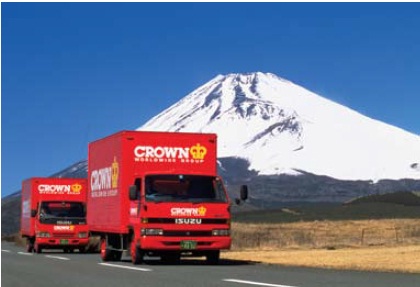by Marie Teather
For many foreigners before even moving to Japan, chances are that a rapid correspondence of emails and phone calls will have long been exchanged with a relocation service provider. Often the first port of call and mentor for countless pre-move inquiries, it can easily be assumed that the guys who quite literally have your big move in their hands, also have the answer to anything remotely related to Japan at their fingertips.
After chaperoning expats backwards and forwards since 1965 and with offices worldwide, Crown Relocation is indeed the long-standing gem to turn to for all international moving queries, and the authority with an insight into global moving trends. Louis Pimentel, General Manager in Japan, offers his reflections of the changing influx of expats moving to and from Asia and how the relocation industry in Japan fits into universal moving practices.
Louis himself is no stranger to the challenges of relocating. After joining the company over ten years ago, Louis was primarily based in the Hong Kong headquarters before moving to the Philippines and then on to Tokyo in 2002. Speaking from his experience in Asia, Louis explained that the financial crisis of 1997 and the ensuing recession quickly brought about a massive downturn in the velocity of relocation packages being offered to employees from destinations far overseas. And with 9/11 in 2001, the impact of both “changed the scenery for quite a while”. Whereas in the bubble years the typical expat being assigned to Asia may have been a single man living it up on company expenses, the slow downturn in the economy saw for an increase in couples and small families taking up life overseas.
In his time in Tokyo heading up three Japan-based Crown Relocation branches, Louis has seen the continuation of another recession-induced trend—this time a preference for Asian talent to receive relocation treatment. Ten years previous, expatriate packages came from US and European soils with the aim of hitting then-promising Far Eastern markets; however as the economy stagnated, plans to set up overseas divisions were stalled. Simultaneously the supply of quality Asian finance executives increased at a time when head-offices were, as the financial magazine CFO reported, “getting tougher about the returns they expect[ed] from their far-flung operations”. Speaking at that time, Kwan Cheep Wei, a Singaporean based director at the consultancy firm Watson Wyatt, added, “if companies have a choice between an Asian CFO with global exposure or a Western expat, all else being equal, they’ll tend to go for the Asian. [He or she] is more likely to understand local markets and people and therefore add greater value to the bottom line”.
Louis then goes on to say that these days, of the expats being assigned to Japan and Asia, a greater percentage have some prior overseas experience. Specifically, in Japan there are fewer ‘first-timers’ indicating that former teachers, those with Japanese spouses, or those who speak Japanese are more likely to be making their return. Positively, of Crown Relocation’s customers in recent years, the number of women relocating to Japan with a ‘trailing partner’ seems also to be on the rise—a statistic supported by the the annual GMAC Global Relocation Trends Survey that in 2006 reported 20 percent of expatriates to be female, a significant jump from the historical 15 percent average.
Of the moving procedure itself and the differences of relocating in Japan, Louis jokes about the many expats that become so immersed into Japanese culture during their time here. When packing up to return home or to their new destination, many customers often demand that packing crews remove footwear before entering their homes. “Of course, in most other countries you have to wear safety boots,” he laughs “but here we get round it by providing special covers for the feet. ”
The slow downturn in the economy
saw for an increase in couples and small
families taking up life overseas.
Talking of the packers themselves, Louis notes that unlike the often burly lifters seen carting furniture around back home, packers in Asia, and particularly Japan, tend to consider their occupation a skill, continuing to add those finishing touches when wrapping fittings and furnishings that would usually be reserved for a department store. A packer working in the US is reported to always pleasantly enjoy opening up boxes sent over from Japan!
Needless-to-say, there are specific Japan-related relocation problems that need to be considered. The inevitable furniture being too big for a Japan-sized entrance has obviously caused difficulties in the past. However, as most movers these days are clued up to potential dimensional problems and plan well ahead, its seems that even the biggest of pianos, sofas, and flat-screen TVs can easily be transported with a little forward planning—especially for those who plan to transport unusual furnishings, which in Crown’s experience have included a tree house, windows, walls from former abodes, reptiles, parrots, and horses. What many customers do neglect to plan for, Louis mentions, is the disposal of unwanted furniture. Unlike in their home countries, customers cannot simply throw out larger furnishings or appliances and so as word of caution, he advises to plan well ahead.
And what lies ahead for the future of the relocation industry in Japan? Louis looks to the positive, noting Japanese companies are more open to making deals with foreign investment and that more joint ventures are taking place than ever before. Furthermore, offering his insider’s knowledge of the huge shipping containers making their way from China to the US packed brim-full of manufacturing goods he adds; “so much is being built in Asia right now, I think there’s a great future for the international relocation business”.
External Link:
Crown Relocation Tokyo offices









